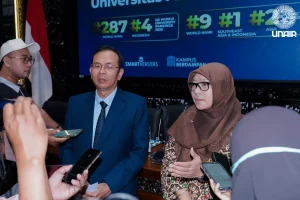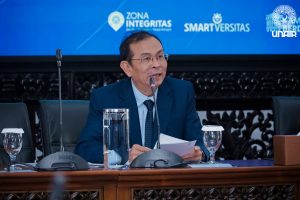UNAIR NEWS – A team of students from Universitas Airlangga (UNAIR) earned first place at the 2025 FISIP Achievement Week Essay Competition, a national event organized by the Student Executive Board (BEM) of the Faculty of Social and Political Sciences at Universitas Negeri Semarang (UNNES) on Saturday (May 24, 2025). Their innovative, tech-driven concept stood out among more than 170 entries from universities across Indonesia.
The team includes three students from different faculties: Mohammad Pradana Setyawan and Intan Rahayu from the Faculty of Vocational Studies (FV), and Rava Adistya Hanum from the Faculty of Humanities (FIB). Despite their varied academic backgrounds, the team’s interdisciplinary collaboration produced a well-developed idea marked by strong analysis and execution.
Embracing smart technology
Team leader Setyawan presented their winning proposal titled “Smart Technology Based on IoT to Reduce Microplastics.” The idea was inspired by growing concerns about microplastic pollution in marine environments and its impact on human health, marine life, and the livelihoods of coastal communities.
The team designed a device equipped with Internet of Things (IoT) technology, featuring sensors, filtration systems, and an enzyme-spraying component to help stabilize ocean pH levels and protect microbial ecosystems. What sets their device apart is its integration with a mobile application, enabling remote monitoring without requiring physical presence at the site.
According to Rahayu, the device’s automatic waste detection and enzyme-spraying system added a unique edge to their innovation.
“What makes our device stand out is its multifaceted capability—it can suction, filter, and distinguish between organic and inorganic waste,” she said.
Hanum shared that the brainstorming phase involved evaluating the urgency and novelty of several potential topics. “We considered a range of ideas—from mental health to agriculture—before deciding on the microplastics issue due to its high urgency and lack of tangible technological solutions,” she explained.
Cross-disciplinary teamwork
Setyawan acknowledged that the road to victory was not easy. From the beginning, the team aimed to compete at a high level alongside leading institutions like UI, UGM, and ITB.
He noted that their strategic edge came from a blend of multidisciplinary knowledge, sharp analytical writing, and a compelling presentation. In the final round, the team delivered a dramatized presentation that stood out from others and left a strong impression on the judges.
After progressing through several stages—from paper review to presentation—the team is now moving toward implementing their idea. They plan to build a prototype and are in discussions with the Surabaya Environmental Agency and UNAIR’s Electrical Vehicle On Study (EV-OS) team.
The success of the project was driven by effective collaboration, clear delegation of responsibilities, and a shared commitment to innovation. Rahayu highlighted the positive team dynamics. “We had no major issues because everyone shared the same vision and complemented each other’s strengths,” she said.
Although this was their first collaboration, the three students are committed to continuing their innovation journey. Hanum expressed hope that the team would pursue further competitions, including at the international level.
Author: Nur Khovivatul Mukorrobah
Editor: Khefti Al Mawalia









